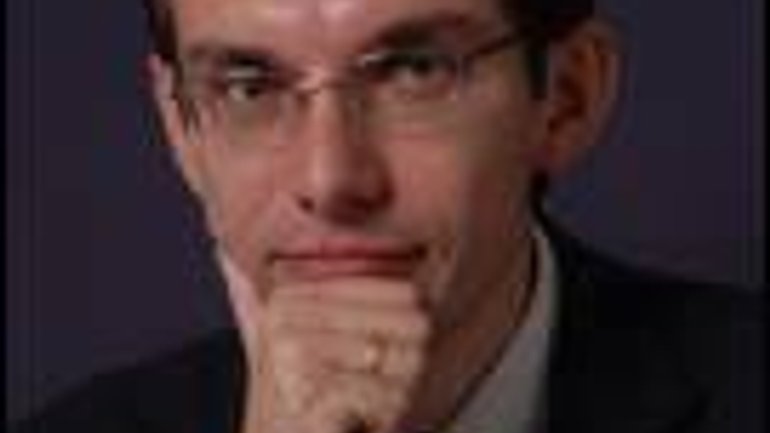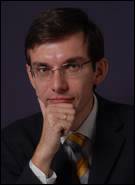“It took a lot of time and effort to convince the government and educators that theology was worthy of study at the university level.”

 Interview with Dr. Taras DOBKO, first vice-rector of the Ukrainian Catholic University.
Interview with Dr. Taras DOBKO, first vice-rector of the Ukrainian Catholic University.
— We are now marking the two-year anniversary of official recognition by the Ukrainian government of theology as an academic discipline. Thanks to the efforts of many people, theology is once again part of the Ukrainian university system. You were one of the people who worked hard to enable this outcome. How would you assess the strides that have been made?
—[Taras Dobko] For many years after independence, theology was not treated as a university discipline in Ukraine, and it took a lot of time and effort to convince the government and educators that theology, like any other discipline in the humanities, was worthy of study at the university level. For me it was an honor to be part of the committee which prepared the necessary documents in this matter. It is one of the biggest achievements in the field of education in Ukraine to which I have been able to modestly contribute.
Not only has it been important to return theology to its place in institutions of higher learning, but also to prepare a new generation of theologians who will build the church and further develop theological studies in Ukraine. In the process of opening other educational programs at UCU [the Ukrainian Catholic University], we are also careful to integrate into them a theological perspective. This is because we are privileged to be bound to the founders of the Lviv Theological Academy who devoted their lives to the church. This is a tradition therefore which we fervently wish to uphold, as the basis of our identity.
— Recently the national committee developing standards in the field of theology met. What results are expected from this group?
— This committee was formed one and a half years ago. It includes representatives from various institutions interested in theological studies such as Yuriy Fedkovych National University in Chernivtsi, Ostroh Academy National University, Ivan Franko National University of Lviv, the National University of the Kyiv Mohyla Academy, the Ministry of Education, the Ministry of Labor and the Higher Qualifications Commission. It’s a fully qualified group, and thus important results can be expected from it.
It’s also important to us that this group is ecumenical and therefore agrees on the requisite basics for educating a theologian. These basics, however, will not act as obstacles to particular denominations and their specific programs. In other words, the basic framework will allow for the necessary freedom of various denominations and universities to formulate their unique programs.
The fundamental achievement of this group up until now has been to agree upon the perimeters for standardization of theological education. Firstly, these agreed upon standards so far relate only to the bachelor’s degree program. Secondly, they specify what the specific functions are which a theologian can fulfill. This is especially important because the Ministry of Labor and Social Policy requires exact information about the qualifications of a person holding this diploma.
It’s already been established that a theologian can occupy various positions which correspond to those requiring a basic humanities education and, in addition, special positions such as, for example, appointments in the church. As for the master’s degree, the committee plans to propose two professional positions – theologian as well as consultant on spiritual, moral and religious issues, although to fulfill these proposals will require a long bureaucratic process.
— What role does UCU play in the formulating these standards for theology?
— UCU’s theological program was taken as a model since its program was put together over a long period with great care to detail and exactness, and is in full operation today. The university prepared all the materials for discussion on the basis of its considerable experience. Throughout the process, we have stressed that we wish to formulate standards for an educational program of high quality which takes into account classic examples of theological education and at the same time is responsive to the Ukrainian context.
After curriculum and the bachelor’s and master’s degree standards are agreed upon, the next step which the Higher Qualifications Commission has already expressed approval of is the notion that theology should be recognized not only as an academic discipline but should be fully qualified in the field of research as well, which will lead to the recognition of a doctor of theology degree in Ukraine. This is also important because it allows for the formal recognition of the Ukrainian degree of doctor of theology abroad.
— Lately there has been more and more of a problem for institutions of higher education to turn out a satisfactory number of qualified graduates, that’s to say, the number of places at universities is higher than the number of high school graduates. Does this raise the competition between institutions? Where does UCU see its place in this competitive market?
— In fact universities are now being confronted with this problem because at the moment institutions of higher learning are in-taking the so-called demographic crisis generation, which marks a period when there was a great discrepancy between the birth and death rate in Ukraine. Another challenge will occur in 2012 when due to reforms in school education, there will be no high school graduating class in that year at all. These are small “apocalypses” which universities have to deal with, especially private ones.
UCU’s opportunities lie in changes in society itself, and its attitude to education. Often teachers and university lecturers complain that students don’t have much motivation to attain higher education because even without it they feel they can manage. As long as this attitude remains, there will be difficulties for all universities, UCU included. But I believe things are changing. When young people start recognizing the value of a quality education and the value of a cultural foundation, they will prefer institutions where they can attain these, and not opt for a superficial education.
From the beginning UCU has placed significant emphasis on the learning of modern foreign languages, and thus our graduates find work, since Ukraine is opening up more and more to the outside world. This is a comparative advantage of our university, as of course all universities have their unique strategy for appealing to prospective students.
— What prospects does a Catholic university have in attracting students from eastern Ukraine where the majority of students are from an Orthodox background?
— If one does not take advantage of opportunities for dialogue and remains distanced from others, then stereotypes will always gain the upper hand. The only way to triumph over stereotypes is to make direct contact. The Christmas Together initiative of which UCU was one of the main organizers exemplified one way in which stereotypes can be broken down. I believe our university has a duty to be more actively present in Kyiv and in the east. The Greek Catholic community also can benefit from such outreach.
However, there are financial considerations. Still today, economic factors prohibit Ukrainians from the kind of mobility they would desire, and thus a small percentage of school graduates choose universities far from home. In this case it’s hard for us to compete with state universities who are subsidized by the government. But we are working on this issue; for example, Fr. Iwan Dacko, president of the Institute of Ecumenical Studies, has established a private fund for support of students from eastern Ukraine. Also UCU’s rector, Fr. Borys Gudziak, who was awarded the Antonovych Prize last year, contributed the prize money to assist exceptional UCU students of other regions in Ukraine. These are specific contributions, but a more systematic plan has been developed and will be put in place in future.
— What is your assessment of the external independent testing system for school graduates? How will this affect institutions of higher education in Ukraine and what will it mean for UCU?
— We’ll see in future what exactly this will bring, but I think it’s definitely a positive thing. It’s not the only method of dealing with corruption in higher education, but if Ukraine has chosen this method, then it should be followed through and not put in doubt, because it will have a positive effect on the problem of bribery and other doubtful admissions practices. However, this practice will also affect selection from among applicants, because the earlier system allowed the university to more precisely select among applicants. For example, for UCU, though we don’t ask applicants about their religious affiliation, it’s important to know that even if the person is an atheist, they regard religion positively. That’s why entrance exams separately included questions on religious knowledge. Now this will no longer be possible. A standard certificate will qualify a student for admission even if the applicant knows nothing about the university. This then requires universities to be more open about informing the public, so that potential students can more easily make their choices. Thus the need for greater interaction with potential applicants is raised, which is good.
UCU will fully cooperate with the external evaluation system because we want to support this initiative. In fact, His Beatitude [Patriarch] Lubomyr Husar [head of the Ukrainian Greek Catholic Church] has called upon the clergy to inform young people about the importance of external testing.
Note: Taras Dobko earned his doctoral degree in philosophy at the International Academy of Philosophy, Liechtenstein. His academic interests include classical phenomenology, phenomenological epistemology, dialectics of secularism and secularization in post-modern culture, philosophy of religion, the phenomenon of the post-Soviet person in the Ukrainian context, the problem of university autonomy and academic culture in modern Ukraine.
Dr. Dobko formerly held the position of assistant dean of UCU’s Faculty of Philosophy and Theology, and subsequently served as academic vice rector. In February 2008 he was appointed senior vice rector of UCU.
Mariana KARAPINKA conducted the interview in Lviv on 17 March 2008.









